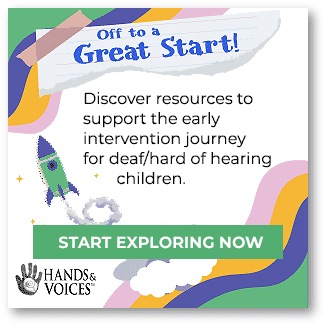A hearing loss can happen when any part of the ear is not working in the usual way. This includes the outer ear, middle ear, inner ear, hearing (acoustic) nerve, and auditory system. Most of the children with a hearing loss are born to parents without hearing loss.
Hearing Screenings: What Families Need to Know
The goal of the universal newborn hearing screening (UNHS) program is to help identify infants who may have a hearing loss as soon as possible. All newborns should have their hearing screened before 1 month of age.
If your child was born in a birthing hospital in Mississippi, a hearing screening was probably conducted. Information about this screening and your child's results should have been shared with you. You may have heard one or more of the following terms used:
- Pass: This means your baby's hearing was considered in the normal range in one or both ears.
- Pass-High Risk: This means your baby's hearing was considered in the normal range in one or both ears; however, your child has one or more risk factors for late onset hearing loss. Your child should receive periodic hearing screenings to determine if any hearing loss has developed.
- Refer: This means your baby's hearing in one or both ears did not respond as expected and further testing is needed. This does not mean your baby has a confirmed hearing loss. Many conditions, including fluid in the ears that may resolve within the weeks after birth, may cause a “refer” on a hearing screen. No matter the reason, a “refer” on a hearing screen should be followed up with additional testing to determine if there is any hearing loss.
- Incomplete: This means your child's hearing in one or both ears could not be tested for some reason. All incomplete results should be followed up with additional testing to determine if there is any hearing loss.
If your baby transferred hospitals due to a medical condition, you may contact your birthing hospital or the hospital your child transferred to in order to determine if your child received a hearing screening or to schedule a hearing screening for your child.
If you were not provided information about the results of your child's hearing screening you may contact your birthing hospital or primary care provider to obtain your medical records or you may contact the EHDI-MS to determine what results were reported for your child.
As your child grows and develops, hearing screenings are important! Only half of the children with hearing loss are born with the condition; the other half lose their hearing throughout their early and middle childhood years. Consult your primary care providers to ensure your child continues to have hearing screenings according to the Bright Futures schedule.
If you have concerns about your child's hearing at any point in time, you may contact your primary care provider or the EHDI-MS, for children up to three years of age, to schedule a hearing evaluation.
Hearing Evaluation: What Families Need to Know
In Mississippi, children who refer on their final hearing screening or who were not provided a hearing screening should have a diagnostic evaluation to determine how they hear. This evaluation will be conducted by an Audiologist. If your child has a medical condition or an infection in their middle ear, you may also see an Otolaryngologist or Ear-Nose-Throat (ENT) Doctor.
What is an Audiologist? Audiologists are the primary health-care professionals who evaluate, diagnose, treat, and manage hearing loss and balance disorders. Audiologists prescribe and fit hearing aids, recommend and program implantable hearing devices, perform ear- or hearing-related surgical monitoring, and provide hearing rehabilitation training such as auditory training, speech reading, and listening skills improvement. For more information, see What is an Audiologist?, Who Are Audiologists?, and Audiologists.
- EHDI-Pediatric Audiology Links to Services (EHDI-PALS)
EHDI-PALS provides a directory of providers of hearing (audiology) services for children from birth to age five. This online directory provides information about the clinical services offered, payment options, languages available and appointment availability. - ABR Test This video describes an ABR Test, what you should expect, what happens during the test, how to prepare for the test, and what happens after the test.
- Finding a Pediatric Audiologist This video describes what Pediatric Audiologists are, what they do, and how to find them.
- Question Prompt List (QPL) for Audiologists Many parents have questions or concerns about their child’s hearing loss that they want to discuss with their audiologist. During busy clinic visits, parents may forget to ask their questions. The QPL, is a tool that can help parents identify and remember questions or concerns they want to discuss during their child’s Audiology appointment.
What is an Otolaryngologist or Ear-Nose-Throat physician? Otolaryngologists are physicians trained in the medical and surgical management and treatment of patients with diseases and disorders of the ear, nose, throat (ENT), and related structures of the head and neck. They are commonly referred to as ENT physicians. ENTs are trained in both the medical and surgical treatment of hearing loss, ear infections, balance disorders, ear noise (tinnitus), and some cranial nerve disorders. They manage birth disorders of the outer and inner ear. For more information, see What is an Otolaryngologist?
- Directory of Mississippi Ear, Nose, and Throat Physicians
Providers for medical and surgical treatment of hearing loss
Early Intervention: What Families Need to Know
In Mississippi, all children ages birth to 36 months with any degree or type of hearing loss are eligible to receive early intervention services under Part C of the Individuals with Disabilities Education Act (IDEA). Through the Mississippi First Steps Early Intervention Program, families are provided a Service Coordinator who will assist them in connecting with early intervention providers who provide signed and cued language services and special instruction for children with hearing loss.
The following provide early intervention services for infants and toddlers with hearing loss:
- The Children's Center for Communication and Development
CCCD offers individual or small group center-based services in the Hattiesburg area and community-based auditory-verbal services in homes, daycares, or other community settings in the Southern Region. - Magnolia Speech School
Magnolia Speech School offers home-based auditory-verbal services statewide through the Parent/Infant program and center-based auditory-oral services in the Jackson area through a Classroom Program. - MS Hearing-Vision Project Mississippi Hearing-Vision Project is a federally funded project to provide technical assistance to individuals between the ages of birth and 21 years, with varying degrees of hearing and vision losses. The MHVP can provide assistance and training to help make your child’s and family’s quality of life better in the home, school, or agency setting.
Learning Experiences
Brochures and Flyers
- Hearing checklist from birth to 3 years
This document provides a list of milestones of hearing development for babies and toddlers - Just in Time | Justo a Tiempo (Spanish)
This document provides a toolkit of essential resources identified by both families and professionals to address hearing-related needs | GuÍa de recursos de la deficiencia auditiva para familias - Newborn Hearing Screening: What to Expect | Evaluasión Auditiva del Recién Nacido: ¿Qué Puedo Esperar?
This brochure provides families information about the universal newborn hearing screening process, including information about hearing, how the screening will be conducted, milestones of language development, and resources on hearing loss in children. | Guía de evaluasión auditiva del recién nacido y recursos de la deficiencia auditiva para familias
Classes:
- EHDI Learning Center
NCHAM provides e-books, journals, instructional modules, webinars, learning communities, workshops, and more to educate families, health care professionals, and early intervention professionals. - Hear to Learn: Resources for Parents and Professionals | Oír Para Aprender: Recursos para padres y profesionales (Español
This website offers a wealth of information in English and Spanish for parents and professionals to support spoken language development. There are materials for activities and tutorials about hearing loss and management including tutorials on topics for hearing loss management, hearing device management, family wellbeing, and listening and language. - Sign It! Classes in American Sign Language (ASL)
Families of children up to 36 months of age who are deaf or hard of hearing can take these free online lessons to learn ASL. Sign It! uses interactive lessons to teach conversational ASL and provides instruction about Deaf culture. - Resources for Learning Cued Speech
This website offers a wealth of information in English for parents and professionals to learn Cued Speech, a visual communication system that uses eight handshapes in four different placements near the face in combination with the mouth movements of speech to make the sounds of spoken language. There are several options for learning in person or online. - Hearing First This website is for family members of a child who is deaf or hard of hearing and Listening and Spoken Language professionals to connect and share your experiences. When you join a Hearing First Community you will receive resources, access to learning experiences, and support from community members to help your child reach their full potential.
Information:
- Baby's First Test
Baby's First Test provides resources to help guide parents on all of the screening conducted on babies in each state. - BabyHearing.org
BabyHearing.org is an informational website developed by a team of Audiologists, Speech-Language Pathologists, Teachers of the Deaf, Geneticists, and Parents of Children who are Deaf or Hard of Hearing at Boys Town National Research Hospital with support from the National Institute on Deafness and Other Communication Disorders.
Organizations:
- A. G. Bell Association for the Deaf and Hard of Hearing
A.G. Bell is a nonprofit organization designed to educate, empower and support parents and families of children who are deaf or hard-of-hearing. AG Bell helps families find meaningful communication options, particularly through development of oral communication supported by amplification devices or cochlear implants. - Mississippi Chapter of A. G. Bell
Mississippi has a local chapter of A.G. Bell that provides support to professionals and families of children who are deaf or hard of hearing. - American Society for Deaf Children (ASDC)
ASDC is a nonprofit organization designed to educate, empower and support parents and families of children who are deaf or hard-of-hearing. ASDC helps families find meaningful communication options, particularly through the use of sign language, in their home, school, and community. - National Center on Deaf-Blindness This federally funded center offers families of children and youth who are deaf-blind (with any degree of both hearing and vision loss) access to services, organizations, learning resources, and opportunities for connecting and sharing.
- Hands & Voices
H & V is a national non-profit, parent-driven organization dedicated to supporting families of children who are deaf or hard of hearing. H & V is non-biased about communication methodologies and believe that families can make the best choices for their child if they have access to good information and support.

Discover early intervention resources at Hands and Voices →

